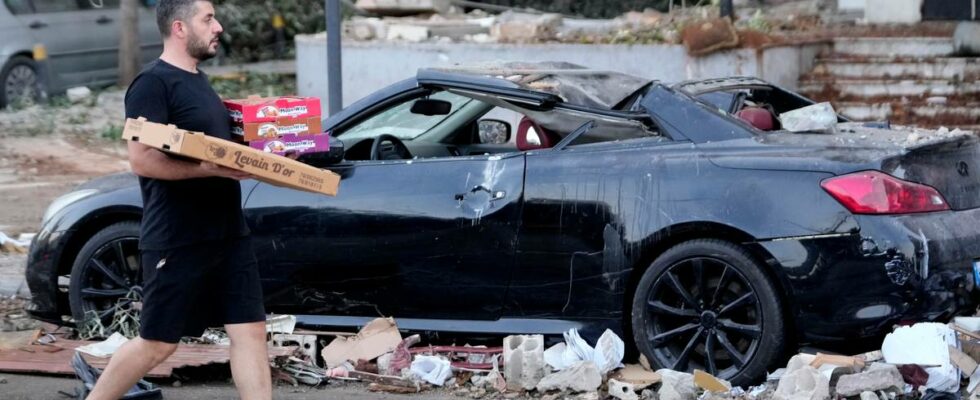– We are ready if Israel attacks over land, says Naim Qassim. He is the deputy leader of Hezbollah, the Iran-backed movement that is Israel’s main enemy in Lebanon. He says that Hezbollah has carried on with its operations at least at the same pace as before, even after their leader, Hassan Nasrallah, was killed in an Israeli attack on Friday. Three leaders of the People’s Front for the Liberation of Palestine (PFLP) have been killed in an Israeli drone attack on an apartment in the Kola district of Beirut, says the group itself. The PFLP is the second largest faction in the Palestine Liberation Organization (PLO). The People’s Front fights with weapons for a Palestinian state and does not recognize the Israeli state. Eyewitnesses told Reuters that early on Monday night they heard a loud bang and saw smoke rising from a hole on the top floor of an apartment building, and that it appeared that the attack was very targeted. Yama Wolasmal shows the area that was bombed by Israel on the night of Monday. The building is located near the Kola intersection, a well-known junction about ten minutes from the center of Beirut. This is the first time since 2006 that Israel has bombed Beirut outside of Dahieh, the southern suburb where Hezbollah has been based. On Monday morning, residents told news that they are afraid that Israel will now hit areas that have been out of the danger zone so far. Two young people look at the destruction of the night, the following morning. Photo: Hussein Malla / AP Several leaders killed Hezbollah confirms today that Israel also killed Nabil Qaouq, who was a member of their central council, in an attack in Beirut on Saturday. On the messaging service Telegram, the PFLP states that the person killed in Beirut is the head of the police bureau, Mohamed Abdel; PFLP military leader for Lebanon, Imad Awda; and Abdul Rahman Abdul Aal. PFLP does not state what role the latter has had. – At least four people were killed in an Israeli drone attack targeting an apartment belonging to Jamaa Islamiya in Beirut’s inner city, says a Lebanese security source to AFP. The Israeli military (IDF) writes on Telegram that they have shot down several attempts at airstrikes against Israel from Lebanese territory during the night of Monday and Monday morning. From the night of the attack to Monday. Photo: Bilal Hussein / AP On Monday morning, Hamas wrote on Telegram that their leader in Lebanon, Fathi Sharif Abu al-Amin, was also killed on the night of Monday. According to Hamas, he was killed in an Israeli airstrike in the al-Buss refugee camp in southern Lebanon, not far from the city of Tyre. Fighter jets from the Israeli Air Force have also “attacked dozens of rocket launchers and buildings where weapons were stored in the Bekaa in Lebanon”, says a statement from the IDF on the Telegram messaging service on Monday night. At least five have been killed there, write Al Jazeera. One million may be sent fleeing On Sunday, at least 105 people were killed in Israeli attacks in Lebanon, and 359 injured, according to figures from the Ministry of Health in Beirut. It also marked a week of Israeli airstrikes in Lebanon. The week started on Monday 23 September, which became the deadliest day in Lebanon’s history since the Lebanese civil war. Lebanon’s Prime Minister Najib Mikati said on Sunday that one million people could be displaced by the attack. Half a million displacements have already been reported, among the several Syrian refugees who have lived in Lebanon in recent years. So far, around 100,000 people have fled from Lebanon to Syria, writes the UN High Commissioner for Refugees, Filippo Grandi on X (formerly Twitter). Two people who have been displaced from their homes are seeking shelter in a park near where the air raid hit last night. Israel’s attack could send a million fleeing, according to the Lebanese government. Photo: Louisa Gouliamaki / Reuters French Foreign Minister Jean-Noel Barrot has been visiting Lebanon since Sunday evening. He met with Prime Minister Najib Mikati late on Sunday evening, and then said that Paris is working for an “immediate halt” to the Israeli attacks. France and Lebanon have historically close ties, and French President Emmanuel Macron has given his support to Lebanon in the conflict. Recently he asked both Hezbollah to stop attacking Israel, and Israel not to escalate in Lebanon. Published 30.09.2024, at 05.53 Updated 30.09.2024, at 11.31
ttn-69
We are ready if Israel attacks on the ground – news Urix – Foreign news and documentaries

